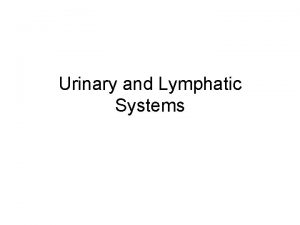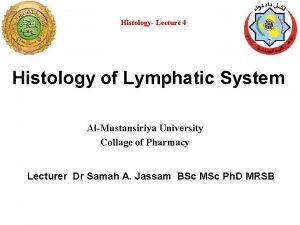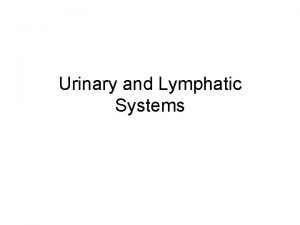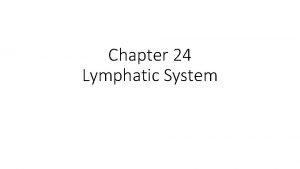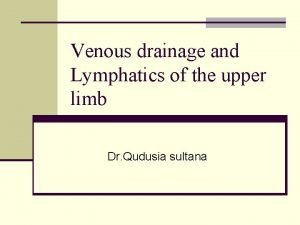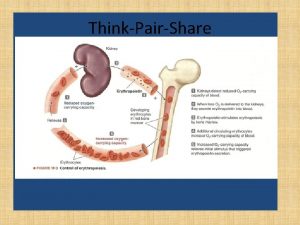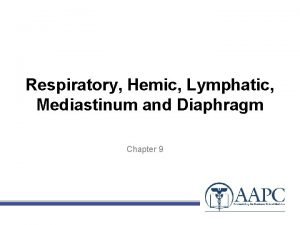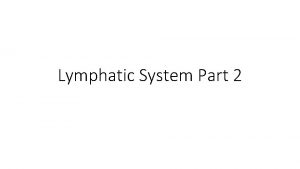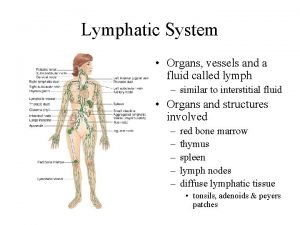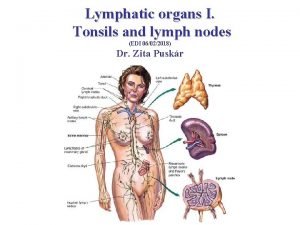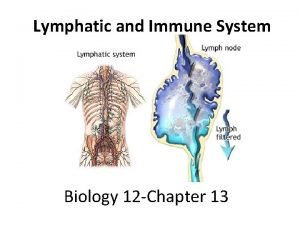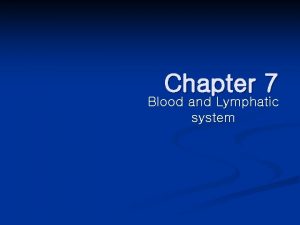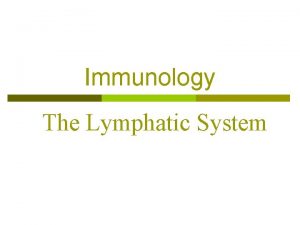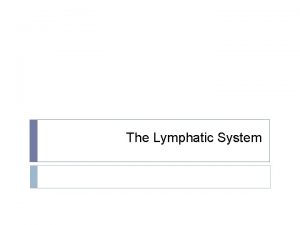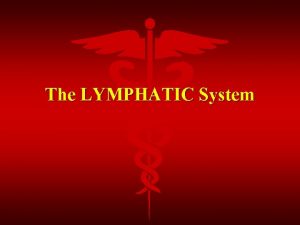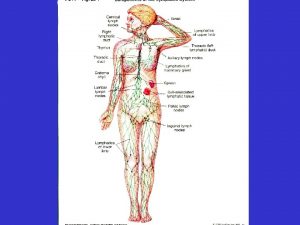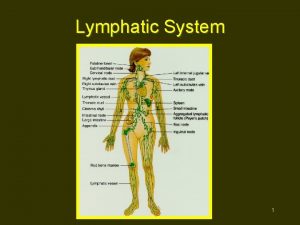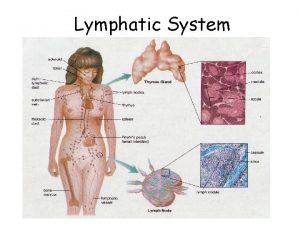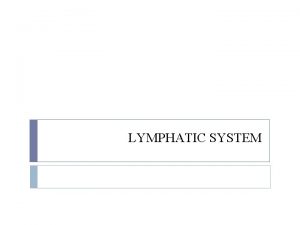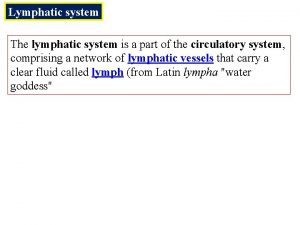Lymphatic System List the functions of the lymphatic





















- Slides: 21

Lymphatic System ¡ ¡ List the functions of the lymphatic system Explain the difference between lymph, blood plasma and interstitial fluid. (intercellular fluid) Explain what filters the lymph in the body Describe how the Lymphocytes create immunity to a pathogen

Lymphatic System: Overview ¡ Consists of two semi-independent parts l l A meandering network of lymphatic vessels (moves Lymph) Lymphoid tissues and organs scattered throughout the body (Filters Lymph) Returns interstitial fluid and leaked plasma proteins back to the blood ¡ Lymph – interstitial fluid once it has entered lymphatic vessels ¡


Different names for the SAME FLUID*** ¡ ¡ ¡ Blood plasma is the watery part of human blood. Interstitial fluid (intercellular fluid) is the fluid found surrounding all the cells of the body Lymph fluid is found in lymph vessels **** These 3 different fluids are the same fluid just with different names depending on where the fluid is located. (blood plasma = Lymph = Interstitial fluid) ¡ http: //www. youtube. com/watch? v=Zd. Yxx 4 CHb-A&feature=related

The lymphatic system It transports a watery clear fluid called lymph = interstitial fluid. ¡ This fluid distributes immune cells and other factors throughout the body. It also interacts with the blood circulatory system to drain fluid from cells and tissues. ¡ The lymphatic system contains immune cells called lymphocytes, protect against antigens (viruses, bacteria, etc. ) ¡

Main functions****** ¡ ¡ ¡ The lymphatic system is composed: l lymph vessels l lymph nodes l organs The functions: l to collect and return interstitial fluid & plasma protein to blood, thus helps maintain fluid balance l to defend the body against disease by producing lymphocytes (B-cells, and Tcells) http: //www. youtube. com/watch? v=x. Hvvijas. Vw 8&feature=related

Lymph organs ¡ Lymph organs include the bone marrow, lymph nodes, spleen, and thymus. ¡ Precursor cells in the bone marrow produce lymphocytes. l B-lymphocytes (B-cells) mature in the bone marrow. l T-lymphocytes (T-cells) mature in the thymus gland.

Lymphocytes***** ¡T l cells Manage the immune response ¡ Helper l ¡B and Suppressor T cells Attack and destroy foreign cells Produce plasma cells, which secrete antibodies l Antibodies immobilize antigens l ¡ Both create memory cells for immunity

Lymphatic Vessels ¡A one-way system in which lymph flows toward the heart ¡ Lymph vessels include: l Microscopic, permeable, blindended capillaries l Lymphatic collecting vessels

Lymphatic System

Lymph Capillaries

Lymph movement ¡ Lymph vessels are closely associated with the circulatory system vessels. ¡ Contraction of skeletal muscle causes movement of the lymph fluid through valves.

Lymphatic Vessels

Lymph Transport ¡ The lymphatic system lacks an organ that acts as a pump ¡ Vessels are low-pressure conduits ¡ Uses the same methods as veins to propel lymph Pulsations of nearby arteries l Contractions of smooth muscle in the walls of the lymphatics l


Lymph Nodes ¡ Their two basic functions are: l Filtration – macrophages destroy microorganisms and debris l Immune system activation – monitor for antigens and mount an attack against them ¡ http: //www. youtube. com/watch? v=q. TXTDqv. Pn. Rk&feature=related

Structure of a Lymph Node Figure 20. 4 a, b

Spleen ¡ Largest lymphoid organ, located on the left side of the abdominal cavity beneath the diaphragm ¡ Functions stores disease-fighting components of the immune system (lymphocytes) l Immune surveillance and response l Cleanses the blood – takes out old and defective red blood cells l

Filtering ¡ Lymph nodes are filters of the lymph ¡ The spleen is a filter for old red blood cells


Disorder of the Lymphatic System ¡ Lymphoma is a group of cancers that affect the cells that play a role in the immune system, and primarily represents cells involved in the lymphatic system of the body. ¡ They often originate in lymph nodes, presenting as an enlargement of the node (a tumor).
 Functions of the lymphatic system
Functions of the lymphatic system Lymphatic system organs and functions
Lymphatic system organs and functions Largest lymphoid organ
Largest lymphoid organ Lymphatic system vs endocrine system
Lymphatic system vs endocrine system Dorsal venous arch
Dorsal venous arch What are the function of lymphatic system
What are the function of lymphatic system Chapter 12 the lymphatic system and body defenses
Chapter 12 the lymphatic system and body defenses Its tubular dude
Its tubular dude Structures of the lymphatic system
Structures of the lymphatic system Lymph composed of
Lymph composed of 10 diseases of lymphatic system
10 diseases of lymphatic system Basilic vein course
Basilic vein course Integumentary interactions with other systems
Integumentary interactions with other systems Pneumocentesis vs thoracentesis
Pneumocentesis vs thoracentesis Lymphatic drainage of abdominal wall
Lymphatic drainage of abdominal wall Organization of the lymphatic system
Organization of the lymphatic system Formation of lymph
Formation of lymph Dho7
Dho7 Lymphatic system organs
Lymphatic system organs Chapter 13 lymphatic system and immunity
Chapter 13 lymphatic system and immunity Exercise 38 review & practice sheet: lymphatic system.
Exercise 38 review & practice sheet: lymphatic system. Chapter 7:9 lymphatic system
Chapter 7:9 lymphatic system

